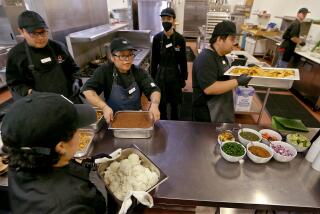In Addition to Food, Restaurant Serves a Social Purpose: Training Mentally Disabled
- Share via
MADISON, Conn. — First there was the Apple Doll House Tea Room in Guilford, a tiny restaurant with a storybook name that challenged entrenched notions that mentally retarded people should be segregated from the rest of society.
Thirteen years later, a vocational rehabilitation organization has gotten even bolder, opening a 200-seat restaurant on a busy highway in the middle of the resort town of Madison.
The wood-paneled Hob Nob, operated by the parents of a mentally retarded teen-ager, now has 15 mentally handicapped adults helping in the kitchen and serving meals.
The venture is one of the projects of the Shoreline Assn. for Retarded and Handicapped Citizens.
“The ultimate goal is to place the trainees in other people’s restaurants,” says Peter McManus, the association’s director of vocational services.
On Highway 1
The new restaurant is in the same roadhouse on U.S. Highway 1 where for 17 years James and Diana Morris operated another Hob Nob until they sold the business nine years ago.
They came out of retirement to operate the new Hob Nob out of commitment to the association and to their 17-year-old son, John, who is mentally retarded.
James Morris, a retired pilot, says he believes in the association’s philosophy that the mentally retarded should live and work among non-retarded people.
The association got into the restaurant business in 1973 when it opened the Apple Doll House, which the organization’s executive director Ted Bergeron says was the first restaurant in the country operated by the developmentally disabled.
In 1978, the association also bought the Country Squire Inn in Killingworth.
About 25 trainees from those restaurants now have jobs in other food service businesses, McManus says. A labor shortage in Connecticut helps rehabilitation organizations find job openings.
Meanwhile, the idea of training retarded adults for food service jobs has caught on around the country. A number of major chains, including Wendy’s and the Marriott Corp., have hired disabled workers. And the National Restaurant Assn. strives to forge partnerships between its members and vocational rehabilitation agencies.
More to Read
Eat your way across L.A.
Get our weekly Tasting Notes newsletter for reviews, news and more.
You may occasionally receive promotional content from the Los Angeles Times.









